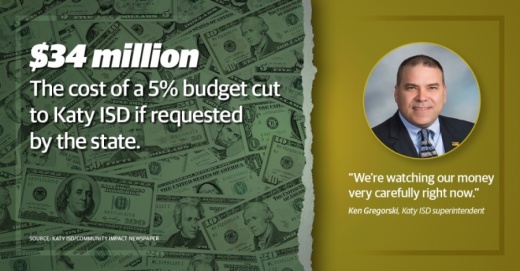Under House Bill 3—an education finance reform law passed by the 86th state Legislature—Katy ISD was able to offer up to an 8% salary increase for the 2019-20 school year. For the 2010-21 school year, the district will offer a 1% employee salary increase and a 1% lump sum payment in December.
Although HB 3 is still in effect for the 2020-21 school year, one reason why KISD is unable to offer a similar increase is because of the economic uncertainty from the coronavirus pandemic and the oil and gas downturn, KISD leadership said at the June 22 regular meeting of the board of trustees.
“[Under] House Bill 3, we were able to put forward one of the largest increases we've ever done in recent history in Katy ISD, and that was great,” KISD Superintendent Ken Gregorski said. “This year with the economy ... our budget is a little bit more conservative.”
KISD Chief Financial Officer Christopher J. Smith said some state agencies have been asked to look at reducing their budgets by 5% next year, though this request has not been made to school districts at this time, Smith said.
Gregorski said a 5% budget reduction would be “pretty devastating to Katy ISD.”
A 5% budget cut would equal about $34 million for the district, he said. The 2019-20 school year budget’s expenditures are about $1.1 billion as of June 1, according to the Katy ISD public dashboard.
“We're watching our money very carefully right now,” Gregorski said.
However, HB 3 has not cost the state as much as it expected because statewide property values rose higher than projected, Smith said. At the May 26 regular board meeting, he said HB 3 appears to cost about $700 million less than budgeted.
“That's good news because hopefully [the state Legislature] put that money aside,” Smith said at the June 22 meeting. “And so when we're looking at the pitfall—or the potential pitfall—that may be ahead of us, maybe then they'll have some savings that they can use to help offset any reduction that they may do.”
Smith underscored the uncertainty of school funding for future budgets, and much depends on what the economy looks like when the state Legislature meets for its 87th session in January.
“The funding for school, for school districts is up in the air, and I think that won't be known until how long this lasts,” Smith said of the pandemic and economic slowdown.





